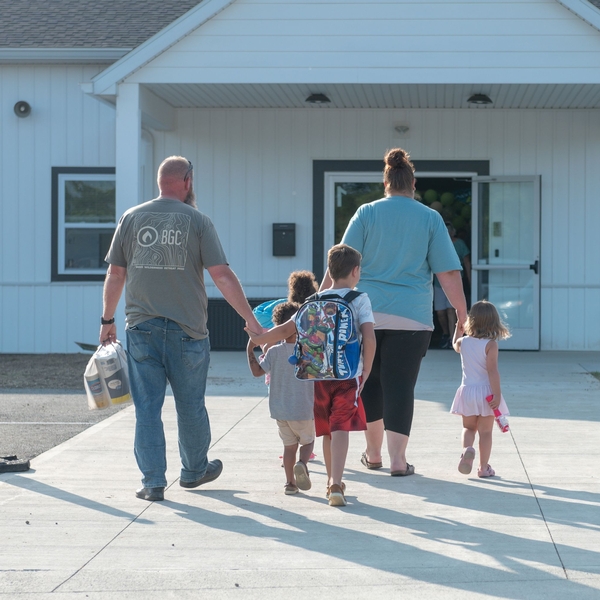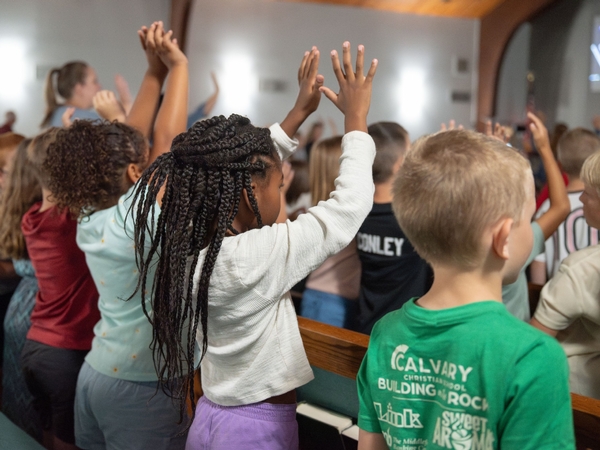Hope & A Future

Jeremiah 29:11 says “For I know the plans I have for you,” declares the Lord, “plans to prosper you and not to harm you, plans to give you hope and a future.”
The Center for Christian Virtue (CCV) recently released a new report called the "2025 Hope and A Future" report. This report (authored by Brad Wilcox, Professor of Sociology and Director of the National Marriage Project at the University of Virginia) examines the current state of the American dream, particularly in Ohio. It’s an interesting read and one we wanted to share with you all (link below). The report reveals the negative effects the collapse of the family unit and a decline in marriage have had in Ohio and across America. There’s also an interesting “Family Structure Index” which gives a ranking to all 50 states according to the health of their family culture.
A summary of Wilcox’s report is that he highlights a decline in belief in the American dream, with only one in three U.S. adults feeling it still holds true, (a decrease from half in 2012). This decline is attributed not only to economic factors but also to the deteriorating state of the American family.
In Ohio, the report notes significant challenges: the state ranks third in deaths of despair (suicide, drug overdoses, alcohol poisoning), 15th in child poverty with 17% of children living below the poverty line, and falls in the bottom quintile for hope. Additionally, Ohio stands 29th on the Family Structure Index, which assesses marriage rates, family stability, and fertility.
The report emphasizes the strong correlation between family stability and positive outcomes in education, poverty reduction, child well-being, public safety, and economic mobility. It also raises concerns about declining fertility rates and their potential impact on Ohio's demographic future.
To address these issues, the report suggests a series of public policies and civic measures aimed at strengthening marriage and family life across Ohio. These recommendations are directed towards the legislature, businesses, churches, and families, with the goal of ensuring that every Ohioan has the opportunity to achieve a "better, richer, and happier life" as envisioned in the American dream.
This is another interesting data set which reinforces something we already know…the family unit is very important! While it’s not a surprise to see data supporting the fact that a life aligned with God’s word is good (and leads to more desirable outcomes!), it’s a stark reminder of the consequences of a life that isn’t. Our mission here is to support that key role our families have, so we want to leave you with some practical steps to keep leading intentionally in your home!
1. Family Devotions: Set aside time each day to read Scripture together, discuss its meaning, and pray as a family. This could be a morning ritual, during dinner, or before bedtime. Our staff have added monthly devotional plans your family can use in the Calvary app if you aren’t sure where to start. You’ll be able to find annual plans and monthly devotional plans that we recommend.
2. Model Prayer: Pray regularly with your children! Not just in times of need, but in moments of gratitude and joy. Let them hear you pray for them, their futures, and God’s guidance in their lives.
3. Intentional Conversations: Use everyday moments to point back to God’s truth. Whether it’s discussing a challenge at school or talking about current events, lead the conversation towards a biblical perspective.
4. Church Involvement: Regular church attendance as a family is crucial. Show your children the importance of being part of a community of believers and serve together in your church. From time to time, we’ll hear frustrations about church, which may include serving with challenging people, disagreements over a church policy, or differences in preferred style of worship. The main point here is that the church has been established by God as His way for us to be connected and further our walk with Him. It’s simply our job to be obedient to scripture!
5. Personal Growth: The most powerful way to disciple your children is to live out your own faith authentically. Children will see this!
View the CCV “Hope & A Future” report here → Family Structure Index | CCV
Chasing Trophies

Like most of America, our family watched the recent Super Bowl (even though we don’t like either of the teams in it…Go Browns). Winning that game, of course, is the pinnacle of success in the football world, the ultimate dream realized. But time and again, the quarterbacks who reach that mountaintop have admitted that the victory, fame, and the championship ring didn’t bring them the fulfillment they thought it would.
It's interesting to hear people like Tom Brady from years past, after winning multiple Super Bowls, who famously said in a 60 Minutes interview:
"Why do I have three Super Bowl rings and still think there’s something greater out there for me? I mean, maybe a lot of people would say, ‘Hey man, this is what it is. I reached my goal, my dream, my life.’ Me, I think, ‘God, it’s gotta be more than this.’"
Kurt Warner, another Super Bowl champion, shared a similar sentiment:
"You think that if you accomplish something, if you reach a certain status, then you will finally be fulfilled. But I realized that success on the field wasn’t going to bring me the purpose and meaning I was looking for—that only came through my relationship with Jesus."
These words from the best in the game remind us of a powerful truth: earthly achievements, no matter how great, can never fill the God-shaped void in our hearts.
It’s a good reminder to make sure we are budgeting our time towards priorities that have an eternal impact. We’re blessed to have that very privilege as we help students cultivate a personal relationship with Jesus Christ. The world constantly tells us that success, trophies, and accolades will bring us lasting joy. But we know that true fulfillment comes only from knowing Christ.
Paul put it this way in Philippians 3:8:
"Indeed, I count everything as loss because of the surpassing worth of knowing Christ Jesus my Lord. For His sake I have suffered the loss of all things and count them as rubbish, in order that I may gain Christ."
We love academics, athletics, clubs, art, and achievements from any endeavor. They are gifts from God. But the achievements themselves cannot be the primary goal. Our co-mission between our school and your family is to shape these students into young men and women who see their worth not in what they accomplish, but in who they are in Christ.
My encouragement is to use this example as a conversation starter with your child this week. Ask them about their goals. Maybe they’ve never thought about setting goals before! What do they want to achieve this year? Maybe a few years from now? Maybe by the end of their high school career? Is it something academic focused? Club focused? A goal towards a certain spiritual discipline? What do they hope that achievement brings them? That can be a great conversation and an important reminder for these students that Jesus wants our hearts. He wants us to be a light for Him in our sphere of influence (whatever it is we are doing), and He cares about our journey as we follow Him; not just the achievements that may come as a result of our work!
As parents, educators, and leaders, we get to invest in something far greater than trophies. We are shaping hearts and minds for eternity. And that’s worth far more than any Super Bowl ring.
So as we watch the big games and celebrate the incredible athletic achievements on display, let’s remember: the greatest victory has already been won, not on a field, but on the cross.
And that victory in Christ is the only one that truly satisfies.
Research Emphasizes the Importance of Family Devotions

Parenting is both a privilege and a responsibility, especially when it comes to the spiritual formation of children. At Calvary, we believe the home is the primary place where a child’s faith is nurtured and developed. Yet, recent research highlights the challenges parents face in successfully passing down their beliefs to the next generation.
A study by Francis, Fawcett, and McKenna found that only half of a parent's religiosity is successfully transmitted to their children. Even more sobering is the statistic that when only one parent is a believer, the likelihood of passing down their faith drops to just 22%. These numbers remind us of the importance of an intentional and unified effort in nurturing faith at home.
Unfortunately, family devotion time has become less common than in previous generations. This decline has significant implications for the relational and spiritual dynamics of the family. Research conducted by ACSI reveals that families who prioritize devotion time together experience notable benefits:
- A 15% increase in children feeling comfortable talking to their parents about faith.
- A 20% increase in families spending quality time together.
- A 12% increase in parents being willing to discuss anything with their children.
These findings reinforce what Scripture teaches about the importance of intentional time spent in worship, prayer, and conversation within the family unit. Significantly, studies show that the specific materials used during family devotion time are less important than the habits themselves. Simply reading the Bible together and praying as a family have the most enduring impact on children’s spiritual growth.
As parents, your role in shaping your children’s biblical worldview cannot be overstated. More than anyone else, you have the opportunity and responsibility to model and instill faith in your children. We exist to partner with you in this eternally significant work! While our programs and teaching aim to reinforce a biblical worldview and truth, the home is where these values must be cultivated and lived out daily.
We encourage you to prioritize family devotion time, no matter how simple it might be. If you need a starting point, head over to the CCS app and click on the family devotion tile. There you’ll find monthly and annual devotionals to support your family devotion routine. Your intentionality will not only shape your children’s faith but also strengthen your family relationships in profound ways. Let’s continue the work to teach truth and prepare disciples!
Spiritual Formation Starts at Home: The Role of Parents in Discipleship

At Calvary Christian School, we believe spiritual formation begins long before a child steps into the classroom. It starts in the home, where parents are called to be the primary spiritual guides for their children. The Bible clearly emphasizes the responsibility parents have to disciple their kids, nurturing them to grow in faith, wisdom, and love for the Lord.
Biblical Foundations for Parental Discipleship
In Deuteronomy 5, Moses is given the ten commandments and in the following chapter, God commands us to keep His law and Word always before us, saying, "These commandments that I give you today are to be on your hearts. Impress them on your children. Talk about them when you sit at home and when you walk along the road, when you lie down and when you get up."
This passage reminds me that discipleship is not a one-time event but an ongoing process that is supposed to be a part of daily life. Parents should see the opportunity to use conversations at the dinner table, bedtime routine, time spent hanging around McKinley Fields to share God’s truth and model a Christ-centered life. This doesn’t have to be a sermon! It can be as simple as recognizing the beautiful day that God has given us or being thankful for the health and energy we have to run around a soccer field.
Similarly, Ephesians 6:4 speaks directly to fathers, urging them to take an active role:
"Fathers, do not provoke your children to anger, but bring them up in the discipline and instruction of the Lord."
This verse is one that highlights the unique role of fathers in shaping the spiritual direction of their children. Research supports this biblical truth. Studies show that when fathers take the lead in spiritual matters, the impact on their children’s faith is profound. In families where the father is a committed Christian and actively leads in faith, approximately 75% (and maybe an even a higher number depending on which study you look at) of the children continue to walk with the Lord into adulthood. This is compared to only about 15% when the father is disengaged spiritually. Wow! A 60% increase simply from the father taking an active role in their child’s spiritual development? What an opportunity!
Practical Steps for Parents
So how can parents, especially fathers, actively disciple their children at home? Here are a few practical ideas: This does not have to be intimidating!
Family Devotions: Set aside time each day to read Scripture together, discuss its meaning, and pray as a family. This could be a morning ritual, during dinner, or before bedtime. Our staff have added monthly devotional plans your family can use in the Calvary app if you aren’t sure where to start. You’ll be able to find annual plans and monthly devotional plans that we recommend.
Model Prayer: Pray regularly with your children! Not just in times of need, but in moments of gratitude and joy. Let them hear you pray for them, their futures, and God’s guidance in their lives.
Intentional Conversations: Use everyday moments to point back to God’s truth. Whether it’s discussing a challenge at school or talking about current events, lead the conversation toward a biblical perspective.
Church Involvement: Regular church attendance as a family is crucial. Show your children the importance of being part of a community of believers, and serve together in your church. From time to time, we’ll hear frustrations about church, which may include serving with challenging people, disagreements over a church policy, or differences in preferred style of worship. The main point here is that the church has been established by God as His way for us to be connected and further our walk with Him. It’s simply our job to be obedient to scripture!
Personal Growth: The most powerful way to disciple your children is to live out your own faith authentically. Children will see this!
Partnering with Parents
At Calvary Christian School, we understand the vital role parents play in the spiritual formation of their children, and we want you to understand it too! Our goal is to come alongside you, provide biblical instruction, support for your home, a nurturing environment, and a Christian community to reinforce the biblical values taught at home. As parents, you have the primary role to disciple your children. We are passionate about seeing young minds turned towards Jesus as they grow not only in academic areas but more importantly in their walk with the Lord. People often talk about future society with fear, frequently worried about the direction the world is heading. We can say on the flipside that we see 500 students currently being rooted in God’s Word every day and will someday soon take that light to Logan county, our state, and our country to shine brightly for Jesus, impacting those around them as well. Now that’s an exciting future!
A Season of Miracles: Reflecting on Calvary Christian School's Journey in 2024

Welcome to the Fall of 2024! As I reflect on these past four years, it’s hard to believe I’ve been blessed to serve at Calvary Christian School for this long. This year marks my 40th in Christian education, and I can say that my current role at Calvary is a dream come true. Through the highs and lows, I’ve witnessed God’s hand at work, guiding this school through challenges, victories, and growth beyond what we could have imagined.
A School with a Rich History
Calvary Christian School has seen its fair share of ups and downs. Starting in 1979 as a small ministry of the church, the school often faced questions about its survival. Could it continue with limited resources and support? Would the church be able to sustain it? Despite these uncertainties, Calvary pushed forward, and by 2012, we took a major step by establishing our high school program, leading to our first graduation in 2016.
Looking back, it feels like a series of miracles. Just as the heroes of faith in Hebrews 11 fought for victories they would never see, the leaders of Calvary laid the foundation for the thriving institution we have today. Without their vision and perseverance, none of the incredible growth we’re experiencing now would have been possible.
Mission and Momentum
At the heart of our success is our unwavering commitment to Christian education. Under the leadership of Ryan Hyde, our Head of School, we’ve developed a program that nurtures the heart, soul, spirit, and mind of our students (Deuteronomy 6:4). Our mission extends beyond academics to include athletics, fine arts, leadership, and discipleship relationships, all centered on God’s Word. It’s a joy to see adults mentoring kids on their spiritual journeys while also excelling in academics and extracurriculars.
Still, challenges remain. Space constraints, limited resources, and a lack of a dedicated gymnasium are just a few of the obstacles we’ve faced. But when a community comes together to champion a cause, God works through His people in magnificent ways. We’ve seen this time and time again, and it’s a powerful reminder that when we align ourselves with His mission, incredible things happen.
Growth by the Numbers
The last four years have been marked by significant growth. Consider these numbers:
- Enrollment: From 230 students in 2019 to 482 in 2024, with projections reaching 655 by 2030.
- Budget: Our operating budget has grown from $800,000 in 2019 to an impressive $4 million in 2024.
- Staff Expansion: We’ve increased our team from 28 to 65 dedicated teachers and staff members.
- Assets: What started with $0 in assets has grown to more than $11 million.
These numbers tell a story of God’s provision and the dedication of our community. But the true impact of these changes goes beyond figures on a page—it’s reflected in the lives of our students.
A School Where Christ is at the Center
Every day at Calvary Christian School, we celebrate moments that matter for eternity. I’ve seen students accept Christ into their hearts and publicly declare their faith through baptism. I’ve watched teachers dive into the Word with their students, guiding them through spiritual formation. Our athletic teams, too, are living out their faith, joining hands in prayer with opposing teams after games and showing their allegiance to Christ in everything they do.
In a world that is increasingly hostile to Christian values, Calvary Christian School is standing firm. We are equipping our students to face the challenges of today’s culture with the truth of God’s Word, and we’re doing it with passion and purpose.
The Road Ahead: Phase 1 and Beyond
We’re not done yet! Since 2021, we’ve embarked on a major building project, starting with Phase 1, which saw the construction of new classrooms and administrative spaces. In January 2023, we moved into our new facility, but Phase 2—a 50,000-square-foot expansion including a gymnasium—is well underway. By December 2024, we expect to complete construction and, God willing, move the entire school to our new campus in January 2025.
This project is a monumental undertaking, and we’ve already raised over $5 million towards our $9 million goal. We still need to raise about $500,000 to fully complete the project, but I am confident that, with God’s help and the continued support of our community, we will reach this goal.
How You Can Help
As we approach the finish line, I invite you to consider joining us in this endeavor. Whether you’ve contributed before or are considering giving for the first time, your support will help make Christian education more accessible and impactful than ever before. We’re planning to honor our donors with a special recognition board in the foyer of our new gymnasium, and we’d love for your name to be part of that legacy.
Thank you to all who have supported us over the years. Your prayers, contributions, and encouragement have been invaluable. Together, we’re building something that will impact generations to come. Let’s continue to lean on God’s faithfulness and pursue His mission with passion and perseverance.
This journey has been nothing short of miraculous, and I am grateful to walk alongside so many faithful servants of Christ as we continue this mission. We’ve come a long way, but the best is yet to come. Will you join us in finishing what we’ve started? Together, we can make a lasting impact on the lives of students for eternity.
You can read the full Development Report for 2024 to see all the details of our journey and growth, including more stories of God’s faithfulness and the milestones we’ve reached along the way.
Click here to read the entire report.
In His service,
Dr. Bragg
Calvary Christian School
Why is Worldview so Important Anyways? A look at our Portrait of a Graduate: Biblical Worldview

It’s a sad story that we’ve heard too frequently. A young person who grew up in a Christian home attends a public university or community college and 4 short years later returns home with a completely different thought process and approach to the world around them. The biblical foundation that had been nurtured at home has been under constant attack while secular philosophies have taken its place. It’s for this reason that it’s so crucial for students to take their time in K-12 education to develop a deeply rooted Biblical approach to the world around us.
So let’s start by taking a brief look at eight of the secular philosophies that surround us today.
Humanism: Humanism is a philosophy that places human beings at the center of meaning and morality. Humanists believe that human beings are capable of morality and self-fulfillment without relying on divine intervention or religious doctrines.
Relativism: Relativism teaches that truth and morality are subjective and can vary based on culture, personal experience, or individual belief. According to relativism, there is no absolute right or wrong; what is considered moral or true depends on individual or societal preferences. This philosophy is often seen in statements like "what’s true for you may not be true for me." (Does this sound like the time of the Judges? They did what was right in their own eyes!)
Materialism: Materialism is the belief that the physical world is the only reality, and anything that exists must be measurable by scientific means. It denies the existence of anything spiritual or supernatural. This worldview often reduces human experiences like consciousness, emotions, and morality to mere chemical or physical processes in the brain.
Naturalism: Closely related to materialism, naturalism holds that everything can be explained by natural causes and laws, without the need for supernatural explanations. In education and science, naturalism often promotes a strictly evolutionary, non-theistic view of the world, rejecting any spiritual or divine aspects of reality.
Postmodernism: Postmodernism argues that there is no single, overarching truth or narrative that can explain reality. Instead, it promotes skepticism of any universal truths, favoring multiple perspectives and interpretations. Postmodernists often challenge traditional beliefs, including religious and moral absolutes, and advocate for deconstructing established narratives.
Secularism: Secularism is the principle of separating religion from civic affairs and government. While this can refer to maintaining religious neutrality in public institutions, it also has evolved into a worldview that prioritizes human reason and empirical science over religious or spiritual considerations, particularly in public policy, education, and culture.
Existentialism: Existentialism focuses on individual freedom, choice, and personal responsibility. It teaches that life has no inherent meaning, and it’s up to each person to create their own meaning through their choices and actions. While existentialism can be either religious or secular, the secular version tends to emphasize human autonomy without divine purpose or guidance.
Hedonism: Hedonism is the belief that pleasure or personal happiness is the highest good and ultimate aim in life.
Whether you’ve recognized it or not, the above philosophies are ingrained into different aspects of the secular thought process in our society, especially education. This highlights the importance of building a biblical worldview!
So what then defines a biblical worldview? A biblical worldview is a way of interpreting and understanding the world through the lens of Scripture. It is based on the belief that the Bible is the infallible, inspired Word of God and serves as the ultimate authority for truth, morality, and the nature of reality. This worldview sees all aspects of life through the principles and teachings found in the Bible.
Key components of a biblical worldview include:
God as Creator and Sovereign: A biblical worldview starts with the belief that God is the Creator of the universe (Genesis 1:1) and has ultimate authority over all creation (Psalm 24:1). He sustains and governs everything, and nothing happens outside of His will and purpose.
Humanity's Purpose: Humans are created in the image of God (Genesis 1:27) with inherent dignity and value. Our primary purpose is to glorify God and enjoy a relationship with Him (Isaiah 43:7). Life’s meaning is found in serving and loving God, not in personal fulfillment or earthly achievements.
The Fall and Sin: A biblical worldview recognizes that the world is fallen due to human sin (Romans 3:23). This fall has affected every aspect of creation, including human nature, relationships, and the environment. As a result, humanity is in need of redemption.
Jesus Christ as Savior: Central to a biblical worldview is the belief that salvation comes only through faith in Jesus Christ (John 14:6). Christ’s death and resurrection provide redemption from sin and offer the hope of eternal life (Romans 6:23). The gospel transforms lives, giving Christians new identities as children of God (2 Corinthians 5:17).
The Authority of Scripture: The Bible is the inspired and authoritative Word of God (2 Timothy 3:16-17). It provides guidance on how to live, think, and understand reality.
Moral Absolutes: A biblical worldview upholds that moral truths are objective and rooted in God’s nature and commands. Right and wrong are not subjective or relative but are defined by God’s standards (Exodus 20:1-17, Matthew 22:37-40).
Humanity's Role in the World: Christians are called to live as ambassadors of Christ in the world (2 Corinthians 5:20). This means engaging in culture, work, and relationships in a way that reflects God’s kingdom values and purpose.
Eternal Perspective: A biblical worldview includes an understanding that life on earth is temporary, and believers are to live with an eternal perspective (Colossians 3:1-2). The reality of heaven and Christ’s return shapes how we view suffering, success, and our ultimate purpose.
What a difference between the secular set of philosophies and a Biblical worldview! This is why at Calvary Christian School, one of the most vital characteristics in our Portrait of a Graduate is the commitment to developing a biblical worldview in our students. This goes beyond simply teaching them to follow rules or adhere to guidelines. Our goal is to nurture students who see the world through the lens of scripture with hearts that are truly transformed, reflecting a deep relationship with Christ, a change that only comes through the work of the Holy Spirit.
All forms of education are taught from a worldview, whether acknowledged or not. In public education, you’ll follow the top list to see the foundation for which the curriculum is built on, it will be grounded in humanism and relativism. In contrast, at Calvary Christian School, the foundation for everything we do is the only true cornerstone, the direct Word of God. We see science, history, and literature not as neutral subjects but as fields that reflect the beauty, order, and sovereignty of the Creator. Colossians 2:8 warns us, “See to it that no one takes you captive through hollow and deceptive philosophy, which depends on human tradition and the elemental spiritual forces of this world rather than on Christ.” We stand firm in teaching students to view the world around them through the truth of Scripture, enabling them to discern truth from falsehood.
Our commitment to a biblical worldview is foundational in developing graduates who are equipped not only to understand the world but to participate in it, with wisdom and conviction. These students have the ability to observe and engage with society through a filter that aligns with God’s Word. They are equipped to evaluate cultural, moral, and spiritual matters in light of biblical principles, which will guide their decisions and actions as they grow into adulthood.
In a world where secular values increasingly influence every aspect of life, our desire is to disciple students who see the world through a biblical lens, shaped by the truth of Scripture and led by the Holy Spirit. This vision for our graduates is not simply about academic success but about cultivating hearts that reflect Christ and minds that are fully anchored in His truth.
Developing Grit: Pursuing Calvary’s Portrait of a Graduate

Growth is a universal desire. We all want to see it in our lives and in our children’s lives. Yet, as we all know, growth never comes without struggle. It’s in the moments of challenge, frustration, and difficulty that growth occurs. Just as a seed pushes its way through the soil to reach sunlight, so too must we endure hardship to experience genuine growth.
The Science of Struggle: The Myelin Sheath
In the world of neuroscience, there’s a process that beautifully illustrates the necessity of struggle in growth. God designed our brains with billions of neurons that communicate with each other. These signals travel along pathways insulated by a substance we call the myelin sheath. The more we practice a skill, the thicker the myelin sheath becomes around the neural pathways, making the skill easier to perform. However, this process doesn’t happen overnight. It requires constant practice, repeated effort, and yes, struggle! Just as an athlete must endure hours of focused training to improve, our students must embrace grit to push through academic challenges to build the "myelin" that will enable them to master new skills. The apostle Paul gives us our motivation for our hard work in Colossians 3:23-24. He says to “work heartily, as for the Lord and not for men, knowing that from the Lord you will receive the inheritance as your reward. You are serving the Lord Christ.” Our desire for growth and skill development is ultimately a reflection of wanting to build the traits and talents that God has blessed us with; and we in turn want to use those abilities to glorify Him.
The Butterfly’s Struggle
Another example of grit producing transformational change in God’s creation is the butterfly. The caterpillar must fight its way out of the cocoon, struggling with all its might. We might be tempted to help, to break the cocoon and free the butterfly, but doing so would rob the butterfly of the strength it needs to fly. The struggle is necessary for its wings to develop the power required for flight. This beautifully represents the growth we want to see in our children. As much as we wish to remove their struggles, we must recognize that these very challenges are what prepare them for the future. The struggle is not a sign of failure but a critical part of their development.
Grit: Calvary’s Portrait of a Graduate
At Calvary Christian, one of the core characteristics in our "Portrait of a Graduate" is grit. Grit is the resolve to push through difficulties, to keep going when the going gets tough. This trait is not just about academic resilience; it’s about developing the character to persevere in faith, even when life’s challenges seem overwhelming. James 1:2-4 says, "Consider it pure joy, my brothers and sisters, whenever you face trials of many kinds, because you know that the testing of your faith produces perseverance. Let perseverance finish its work so that you may be mature and complete, not lacking anything."
Encouraging Families Through the Struggles
It’s important to remember that growth is a process, often marked by moments of difficulty. Here are three ways you can support your students as they encounter seasons of struggle:
Be Patient and Encouraging: Growth takes time! When your child is facing academic or personal challenges, remind them that it’s okay to struggle. Encourage them by celebrating small victories along the way. Galatians 6:9 reminds us, “Let us not become weary in doing good, for at the proper time we will reap a harvest if we do not give up.”
Model Perseverance: Our children learn more from our actions! When you encounter your own challenges, model perseverance and faith. Show them how you rely on God during tough times. Proverbs 3:5-6 says, “Trust in the Lord with all your heart and lean not on your own understanding; in all your ways submit to him, and he will make your paths straight.”
Pray Together: There is power in prayer! When struggles arise, take time to pray with your children. Ask God for strength, wisdom, and perseverance. Philippians 4:6-7 encourages us, “Do not be anxious about anything, but in every situation, by prayer and petition, with thanksgiving, present your requests to God. And the peace of God, which transcends all understanding, will guard your hearts and your minds in Christ Jesus.”
Cultivating Growth: A Greenhouse Instead of a Shelter

As partners in discipleship, our goal to transform student lives through Jesus Christ in a world that’s running the other direction is full of challenges! It can be tempting to want to shield them completely from external influences. Calvary is not designed to simply be a shelter that blocks out the world, but a greenhouse that nurtures growth over time while allowing students to form deep roots in God’s Word as they grow in their understanding of a Biblical worldview.
The Shelter
If we think about a shelter, while protective, by definition is isolated from the outside world. It creates a barrier between them and any potentially harmful influences, but this can also prevent them from developing the resilience, discernment, and wisdom needed to navigate life beyond our doors. As they eventually step out into adulthood, the sudden exposure to the world can be challenging, like a fragile plant abruptly placed in harsh conditions.
The Bible reminds us that while we are "not of the world," we are sent "into the world" (John 17:14-18). Jesus prayed not for His disciples to be removed from the world, but for their protection and sanctification as they remained in it. It’s not possible nor desirable to be completely sheltered to the world, but a safe place to grow deep roots is essential while critical worldviews are being formed.
The Greenhouse
A greenhouse, on the other hand, creates an environment where plants can flourish. It provides sunlight, water, and warmth; elements essential for growth, while still protecting young plants from harsh winds and cold. The greenhouse doesn’t shut out the world; it provides the proper environment for what’s growing inside to truly flourish in time.
In the same way, Calvary strives to provide an environment where students can be exposed to challenges while still under the nurturing care of godly teachers and supportive parents. Proverbs 22:6 instructs us to "train up a child in the way he should go, and when he is old he will not depart from it." The greenhouse approach aligns with this principle, allowing roots to grow like an anchor while students are being grounded in biblical truth. Rather than merely shielding our students, we aim to equip them with the tools they need to engage with secular culture in a biblical manner. Ephesians 6:10-18 speaks of putting on the full armor of God so we can stand firm. Just as a plant in a greenhouse grows stronger through carefully measured exposure to the elements, our students grow stronger in faith, character, and wisdom as their roots deepen in God’s Word. We want to foster young believers who are firmly rooted in the Word of God and ready to stand strong, living as "salt and light" (Matthew 5:13-16). Our role is to nurture this growth through Christian education in a way that protects and prepares, discipling our students to become witnesses for Christ in whatever environment they are placed in.
In our greenhouse, students can safely practice using the biblical tools they’ve been given. They will learn how to discern truth from falsehood, respond to challenges with grace, and stand firm in their faith while being compassionate and wise in their interactions with the world.
Partnering with Parents: Monitoring Social Media and Encouraging Family Time

As we continue our mission to disciple believers in Christ, we recognize our role in helping guide the whole family as we work towards the profile of a graduate. We know there are many challenges that our world presents in an attempt to minimize the effectiveness of biblical worldview development, so we must be vigilant and intentional in our efforts. In today’s digital age, the challenges of monitoring social media and online use have become more complex and critical than ever before.
The Impact of Screen Time and Social Media - Phil 4:8
The allure of screens and social media can be powerful. While technology offers numerous benefits, it also presents risks, particularly for young minds still learning to navigate the world. Excessive screen time has been linked to various issues, including decreased attention span, disrupted sleep patterns, and, as we’ve observed, increased anxiety and other mental health concerns. Social media, in particular, can foster unhealthy comparisons, expose children to inappropriate content, and detract from the face-to-face interactions essential for developing strong interpersonal skills.
As parents, it’s crucial to actively monitor and guide your children’s online activities. Setting limits on screen time is not just about reducing exposure to potentially harmful content; it’s about encouraging your child to engage in more meaningful, God-honoring experiences, both within the family and in their personal lives.
Encouraging Family Time
One of the most effective ways to counterbalance the influence of screens is to prioritize family time. Engaging in activities together, whether it’s sharing meals, playing games, or simply talking about the day, helps build stronger family bonds and provides your child with the needed connection.
Here are a few conversation starters you can use when your child comes home from school:
“What was the best part of your day today?” This question encourages your child to reflect on positive experiences.
“Did you learn something new or interesting in class today?” This helps them engage with what they’ve learned and share it with you.
“How did you spend your break times?” This can give you insight into how they interact with peers and use their free time.
“Did anything surprise or challenge you today?” Encouraging them to share challenges fosters resilience and problem-solving skills.
“What did you learn about God and His character today?” Encourage students to think about their lessons from the day and what they’ve learned about who God is.
These questions not only help you stay connected with your child’s daily life but also signal that you are interested and involved in their world, which can open the door to deeper conversations.
The Importance of Physical Activity and Personal Connection - 1 Cor. 6:19-20
In addition to monitoring screen time, it’s vital to emphasize the importance of physical activity in your child’s life. Regular exercise is not only essential for physical health but also plays a significant role in mental well-being. Whether it’s participating in sports, taking a walk together, or just playing outside, encouraging your child to be active helps reduce stress and anxiety while promoting a healthy lifestyle.
Moreover, personal connections are key to developing empathy, communication skills, and emotional intelligence. By fostering environments where your child can engage in real-world interaction; whether through family time, extracurricular activities, or social gatherings…you are helping them build the social skills they need to thrive!
Partnering Together for Our Children’s Future
At Calvary, we’re committed to partnering with you all as we seek to guide our students toward that picture of transformation in Jesus Christ. One small way we can do that is by taking proper precautions with social media and how we engage with those around us. Let us strive together each day to be ambassadors for Christ who are daily seeking to be more like Him!
Why Calvary Has Removed Cell Phones: Prioritizing Mental Health and Interpersonal Growth

Why Calvary Christian School Has Removed Cell Phones: Prioritizing Mental Health and Interpersonal Growth
At Calvary Christian School, we are committed to creating an environment that nurtures not only academic excellence but also the spiritual well-being of our students. As we move into our second year of a no-cell-phone policy on campus, we want to discuss the reasoning behind our initial decision and showcase the positive impact we’ve already seen.
The Distraction Dilemma
Cell phones, for all their benefits, have increasingly become a source of distraction in educational settings. The constant ping of notifications, the subtle buzz of a smartwatch, or even the mere presence of a device in a student’s pocket can pull focus away from learning. Young learners (and adults for that matter) can easily become addicted to the dopamine rush that comes through our constant connectedness. These distractions, while seemingly small, add up to significant interruptions in the flow of a school day.
For many, the ability to connect instantly with others through text messages, social media, and various apps is a constant temptation that can disrupt both classroom concentration and the ability to fully engage in face-to-face interactions. By removing cell phones from our campus, we have already noticed a marked improvement in students' focus during lessons and their overall engagement with our curriculum.
The Link Between Cell Phones and Mental Health
Beyond the issue of distraction, our decision was also influenced by growing concerns over the impact of cell phones on student mental health. Numerous studies have pointed to a troubling correlation between increased cell phone use and a rise in anxiety, depression, and other mental health challenges among young people.
As educators and partners with our school families, we have a responsibility to put our students in the best position for success. The constant comparison to others on social media, the exposure to online bullying, and the relentless influx of information can be overwhelming for developing minds. By limiting access to cell phones, we’ve taken a proactive step in reducing these sources of stress and helping our students cultivate healthier mental and emotional lives.
Looking Ahead: Year 2 Without Cell Phones
As we enter the second year of our no-cell-phone policy, we are excited to continue seeing the positive effects of this change. Without the distraction of devices, students are more present in their interactions with peers and staff, fostering stronger interpersonal relationships and communication skills. We’ve witnessed firsthand the benefits of face-to-face conversations, collaboration, and the simple joy of unmediated social interactions. Our students are developing the kind of interpersonal skills that will serve them well throughout their lives, skills that are often diminished in a world dominated by screens!
A Commitment to Growth
At Calvary Christian School, we believe that education is about more than just academics. It’s about nurturing the whole person; mind, body, and spirit. Removing cell phones from our campus is just one way we are working to create a more focused and an even more connected school environment. We are grateful for the support of our community in this initiative, and we look forward to another year of growth, learning, and meaningful connections! Together, we are building a school culture that prioritizes the well-being and personal development of every student, and we couldn’t be more excited about the future!
A Testament to God's Provision: $250,000 Grant Received!

A Testament to God's Provision: $250,000 Grant Received!
In moments of reflection on this incredible journey to build our new school, we can’t help but stand in awe of God’s provision. The dream of a new facility, one that will build a biblical worldview, nurture young minds, and shape future leaders seemed daunting at the outset. Yet, here we are, having just received another miracle…a $250,000 grant—an amount that is nothing short of miraculous.
The Power of Faith and Community
When we embarked on this mission, we did so with faith in God’s plan and confidence in our community’s support. Time and again, we’ve seen how God moves through the hearts of His people, prompting generosity and a shared vision for what this school represents. Each donation, large or small, has been a testament to the power of collective faith and the willingness to invest in the future. This recent grant was the result of a senate fund that was earmarked for projects that were community based. We went through the application process last spring and followed up with several meetings both at Calvary and in the Ohio Statehouse. We are thankful to be 1 of only 5 school in Ohio that received any funding!
A Milestone Worth Celebrating
Raising $250,000 is no small feat and we are thankful for the continual miracles that are making this new campus a reality. Our plan is to use the $250,000 to pay for items in the gym including our new gym floor and gym bleachers. But just as importantly, this achievement stands as a reminder that when we place our trust in God, He is faithful to provide!
The Finish Line is Near: $300,000 More to Go
While we rejoice in this accomplishment, our journey is not yet complete. We now turn our focus to the final phase of initial funding for the phase 2 project, raising the remaining $300,000 needed to equip the inside of the building. The kick here is we need to raise this money by the end of December! This timeline is crucial because that's when our invoices for the inside of the building items will be due.
Stepping Out in Faith
As we look ahead, we do so with the same faith that has brought us this far. We believe that God, who has provided for us so abundantly already, will continue to move in the hearts of those who share our vision. Whether through financial contributions, prayers, or spreading the word, there are many ways to be part of this final push!
A Call to Action
We invite you to consider how you might contribute to reaching this final goal. We know this is going to be a campus that transforms the lives of students and families for decades to come. Your support will not only help us complete the physical building but will also play a vital role in shaping the lives of countless students who will walk through its doors.
Let’s continue to trust in God’s provision as we work together to see this dream fully realized. With $300,000 more to raise, we know that with God’s guidance and your support, we will cross the finish line.Thank you for being part of this journey, and for believing in the future we’re building together!
Anyone wishing to donate online can do so here Race to the Finish of Phase 2!
We’d also love to meet with you! Meet with our Development Director Dan Bragg and hear more about this project by emailing dbragg@calvarybellefontaine.org
The Value of Christian Education

At the start of the 2022-2023 school year, I stepped into a new job at a Christian School. Specifically, I became the Chaplain at Calvary Christian School in Bellefontaine, Ohio.
My job has not been limited to my duties as a chaplain. At the time of writing this, I’ve had the privilege to substitute teach at every grade level. While subbing is not always easy (my apologies to any students who have asked me math questions!), it has given me valuable insight into the world of Christian education. In light of that, I want to share why I think Christian education is a wonderful thing.
I can’t summarize the value of Christian education any better than a wise man at my church. He says, “We wanted to send our kids somewhere that would reinforce what they were learning at home and at church, not contradict it.”
Let’s hone in on those two emphasized words: reinforce and contradict.
Google searching the definition for “reinforce” provides the following definition:
strengthen or support (an object or substance), especially with additional material
And for “contradict”:
deny the truth (a statement) by asserting the opposite
Broadly speaking, a Christian school is going to strengthen and support your student with additional material. The “additional material” provided by a good Christian school is going to be biblically and theologically sound.
A public school, by contrast, has no obligation to teach biblical truth. Thus, a public school will have no issue with denying the truths of Scripture and asserting other teachings in its place. To be clear, I am not against public schools. I think there are wonderful public schools with wonderful Christian educators, and I am thankful for them. I am merely bringing up a fact of the matter at hand. Public schools cannot teach your student that God created the universe; a Christian school can. Public schools will teach your students history from a secular perspective; a Christian school can teach your student history from a biblical perspective—the list goes on.
In America, the chasm between Christianity and secularism is growing more apparent. Secular philosophies that oppose the truth of Scripture are becoming more prevalent in public schools. While Christians are not called to seclude themselves from the world, Christian parents do have an obligation to train up their children in the way they should go (Proverbs 22:6). While discipleship in the local church and in the home are the primary means for accomplishing this, Christian education can be an tremendous serve as a tremendous aid.
Most kids spend a great deal of time in school (6–7 hours a day on average; from K4–12th grade, that amounts to nearly 17,000 hours). It is worth considering how their education is shaping them. I’m thankful for Christian schools that not only help educate young minds but also aim to help students be transformed by the renewing of their minds (Romans 12:2). I’m thankful for Christian schools that come alongside families and reinforce the students’ biblical foundation that is being instilled in them at home.
If you’re a Christian parent and you’re looking for this kind of reinforcement, then perhaps Christian education is the right move for you.
Best,
Pastor Joey
Do not be conformed to this world, but be transformed by the renewal of your mind, that by testing you may discern what is the will of God, what is good and acceptable and perfect. Romans 12:2


God bless you for speaking truth and upholding Christian values.